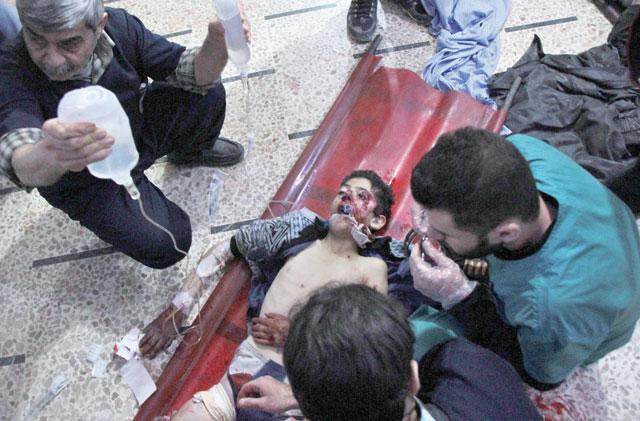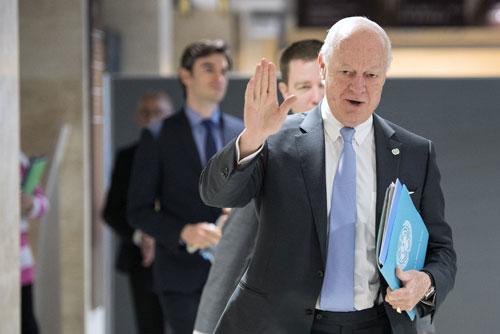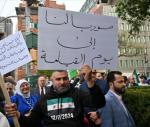You are here
Hesitant Syria opposition begins talks with UN envoy
By AFP - Feb 01,2016 - Last updated at Feb 01,2016
GENEVA — Syria's main opposition group met formally for the first time Monday with the UN special envoy, although it was unclear whether they would agree to indirect peace talks with the Assad regime.
The preliminary meeting between the High Negotiations Committee (HNC) and Staffan de Mistura came as the UN reported eight more deaths from insufficent medical care in one of the many towns besieged by government or rebel forces.
The HNC is insisting that humanitarian aid reach towns under government siege before it will agree to enter indirect talks with President Bashar Assad's government, which are scheduled to last six months.
The talks are part of the biggest push to date to chart a way out of the tangled Syrian war that has killed more than 260,000 people and forced millions from their homes since the violence began in March 2011.
The urgency to find a solution was brought home Sunday when attacks claimed by the Daesh terror group killed 71 people near a revered Shiite shrine outside the capital Damascus, according to monitors.
The new deaths reported Monday by the UN humanitarian organisation (OCHA) took place in Moadimayet Al Sham southwest of Damascus, the site of a 2013 chemical weapons attack. OCHA said there had been a "sharp deterioration of the humanitarian situation" in the town, which has been besieged by Assad's forces since 2012, although conditions improved after a 2014 truce deal.
Ambitious roadmap
De Mistura's brief in Geneva is to coax the warring sides into six months of "proximity talks" as part of an ambitious roadmap agreed by the many outside powers embroiled in the war.
The plan, hammered out in Vienna in November, envisions elections within 18 months, but the key question about the future of Assad — backed by Iran and Russia — was left until later to resolve.
British Foreign Secretary Philip Hammond said on Monday the talks “must deliver a political transition away from Assad”, but experts say the West is backing off from demands that he leave before any such transition starts.
In addition to humanitarian aid, the HNC — which only reluctantly arrived in Geneva late on Saturday — is also demanding the Assad regime free prisoners and that its Russian backers stop bombarding civilians.
“We are here for political negotiations but we cannot start those until we have those gestures,” HNC spokeswoman Basma Kodmani told reporters on Sunday.
A Western diplomat said de Mistura had on Sunday made proposals to a mistrustful HNC during an informal meeting, but that they were still hesitating. The nature of his proposals were not clear.
Outside powers were also in Geneva keeping a close eye on proceedings, with the Syrian government’s chief negotiator Bashar Al Jaafari reportedly meeting with the Russian ambassador, and Western envoys touching base with the opposition on Sunday.
A US official said that Anne Patterson, US assistant secretary for Near Eastern Affairs and US Syria envoy Michael Ratney were to meet Russian Deputy Foreign Minister Gennady Gatilov on Monday in Geneva.
Another thorny issue in Geneva is which rebel groups will be involved in the talks, although all sides agree on the exclusion of Daesh and Al Nusra Front, Al Qaeda’s Syrian branch.
The powerful Army of Islam rebel group is part of HNC’s delegation, and the HNC’s chief negotiator and Army of Islam member Mohammed Alloush — considered a “terrorist” by Moscow — arrived in Geneva on Monday.
In addition, and in a potentially hopeful sign, Western diplomats said on Sunday that Riad Hijab, the head of the HNC and a former Syrian prime minister, was also due in Geneva soon.
Speaking Monday, UN chief Ban Ki-moon said he was “extremely glad” the talks had started, describing them as “long overdue”.
“I urge all parties to put the people of Syria at the heart of their discussions, and above partisan interests. Civilians, including children and women, are bearing the brunt of this conflict,” Ban said in Oman.
Meanwhile, foreign ministers from around 20 countries including US Secretary of State John Kerry were to meet in Rome Tuesday to discuss efforts to combat Daesh. And on Thursday an international donor conference in London will discuss how to help 13.5 million people vulnerable or displaced inside Syria, as well as 4.2 million Syrian refugees in neighbouring countries.
Related Articles
GENEVA — The UN special envoy for Syria fought Sunday to keep alive the biggest diplomatic push yet to end the Syrian war as Washington urge
GENEVA — The United Nations will try to revitalise its flagging Syria peace process this week, buoyed by the prospect of hosting a unified o
MOSCOW/GENEVA — The United Nations said on Wednesday no date had been set for the next round of Syria peace talks, contradicting a report qu

















